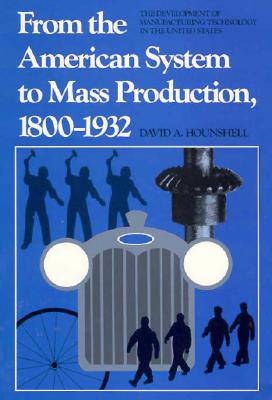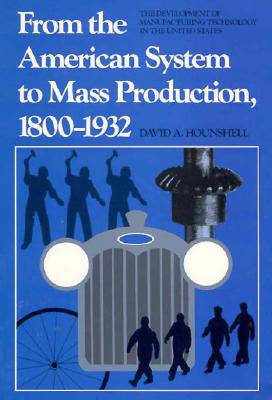
- Afhalen na 1 uur in een winkel met voorraad
- Gratis thuislevering in België vanaf € 30
- Ruim aanbod met 7 miljoen producten
- Afhalen na 1 uur in een winkel met voorraad
- Gratis thuislevering in België vanaf € 30
- Ruim aanbod met 7 miljoen producten
From the American System to Mass Production, 1800-1932
The Development of Manufacturing Technology in the United States
David HounshellOmschrijving
David A. Houndshell's widely acclaimed history explores the American "genius for mass production" and races its origins in the nineteenth-century "American system" of manufacture.
Previous writers on the American system have argued that the technical problems of mass production had been solved by armsmakers before the Civil War. Drawing upon the extensive business and manufacturing records if leading American firms, Hounshell demonstrates that the diffusion of arms production technology was neither as fast now as smooth as had been assumed. Exploring the manufacture of sewing machines and furniture, bicycles and reapers, he shows that both the expression "mass production" and the technology that lay behind it were developments of the twentieth century, attributable in large part to the Ford Motor Company.
Hounshell examines the importance of individuals in the diffusion and development of production technology and the central place of marketing strategy in the success of selected American manufacturers. Whereaas Ford was the seedbed of the assembly line revolution, it was General motors that initiated a new era with its introduction of the annual model change. With the new marketing strategy, the technology of "the changeover" became of paramount importance. Hounshell chronicles how painfully Ford learned this lesson and recounts how the successful mass production of automobiles led to the establishment of an "ethos of mass production," to an era in which propoments of "Fordism" argued that mass production would solve all of America's social problems.
Specificaties
Betrokkenen
- Auteur(s):
- Uitgeverij:
Inhoud
- Aantal bladzijden:
- 440
- Taal:
- Engels
- Reeks:
- Reeksnummer:
- nr. 4
Eigenschappen
- Productcode (EAN):
- 9780801831584
- Verschijningsdatum:
- 1/09/1985
- Uitvoering:
- Paperback
- Formaat:
- Trade paperback (VS)
- Afmetingen:
- 178 mm x 250 mm
- Gewicht:
- 839 g

Alleen bij Standaard Boekhandel
Beoordelingen
We publiceren alleen reviews die voldoen aan de voorwaarden voor reviews. Bekijk onze voorwaarden voor reviews.











